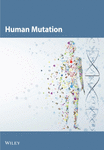Mutation analysis in CD40 ligand deficiency leading to X-linked hypogammaglobulinemia with hyper IgM syndrome
Abstract
Mutations in the gene encoding CD40 ligand have been shown to be the cause of X-linked hypogammaglobulinemia with hyper IgM (HIGM1). We have used the technique of single strand conformational polymorphism (SSCP) analysis to screen for mutations in this gene in affected boys from nineteen unrelated families. Sixteen novel mutations were identified in patients, comprising six patients with single base substitutions, two patients with single base insertions, six patients with deletions ranging from one to seven bases and two patients with large deletions at the 5′ end of the gene. These mutations were distributed throughout the gene. SSCP band shifts and/or alterations in restriction enzyme digestion sites could be used for unambiguous determination of carrier status in at-risk female relatives of most of the affected boys and, in some cases, prenatal diagnosis also can be offered. © 1996 Wiley-Liss, Inc.




